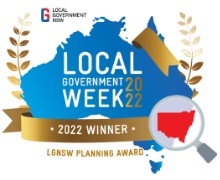Aboriginal heritage

Woollahra Municipal Council was the big winner at the Local Government Week 2022 Awards, taking home two awards for the Woollahra Aboriginal Heritage Study, a collaboration between Council, archaeologists from Coast Heritage and History and the La Perouse Local Aboriginal Land Council to promote greater community awareness and appreciation of Aboriginal heritage.
Woollahra Council won both the Leo Kelly OAM Arts & Culture Award - Strategic Cultural Plan or Strategy Award and the LGNSW Planning Award for Culture Change Innovation & Excellence, as well as an award for The Woollahra Gallery at Redleaf.
"We are delighted to have won awards tonight in all of the three Local Government Week categories we entered. The Awards represent a great team effort and our strong commitment to cultural development and preserving our local Aboriginal heritage," said the General Manager of Woollahra Municipal Council, Craig Swift-McNair.
Woollahra Municipal Council Aboriginal and Torres Strait Islander Protocols and Guidelines
The Woollahra Municipal Council Aboriginal and Torres Strait Islander Protocols and Guidelines(PDF, 894KB) have been developed with the support and advice of the La Perouse Local Aboriginal Land Council. They are intended to offer Council staff and community members some insight into Indigenous cultural protocols, Reconciliation and the rich Indigenous history of the Country that the Woollahra Local Government Area encompasses. They are not intended to replace engagement with the La Perouse Local Aboriginal Land Council or the Aboriginal and Torres Strait Islander community.
A walk through history: in the footsteps of the Gadigal people
Woollahra Council acknowledges that we are on the land of the Gadigal and Birrabirragal people, the traditional custodians of the land. We pay our respects to Elders past, present and emerging and acknowledge Aboriginal or Torres Strait Islander people living in, working in, or visiting Woollahra.
The local area is rich in evidence of early Aboriginal history. There are over 70 sites including 13 midden sites, 29 rock engraving and numerous shelters, many with axe grinding grooves where stone tools were made and sharpened. Some sites are in private gardens: others are in parks and public areas, with a number along coastal walks and the harbour foreshore.
Parkland and foreshore areas have preserved much of the vegetation that provided the "kitchen gardens" used by the original inhabitants.
Woollahra Aboriginal Heritage Study
The Woollahra Aboriginal Heritage Study provided Council with a much better understanding of the Aboriginal history and heritage of Woollahra; where traces of that history are known, and where others are likely to be. It also provided Council with a recommended strategy for managing known and undocumented Aboriginal heritage. This will influence management of future development in the LGA and promote greater awareness of local Aboriginal heritage in the community and across Council in a culturally appropriate manner.
The Woollahra Aboriginal Heritage Study(PDF, 12MB) was endorsed by Council on 26 July 2021.
Woollahra Council was a big winner at the Local Government Week 2022 Awards (4 August 2022) with the Strategic Planning team winning the Local Government NSW Planning Award, and the Leo Kelly OAM Arts and Culture Award in the Plan or Strategy category for the Woollahra Aboriginal Heritage Study.
The Woollahra Council Strategic Planning Team and project lead Flavia Scardamaglia won the Aboriginal Heritage category in the National Trust NSW 2022 Heritage Awards for the Woollahra Aboriginal Heritage Study, announced on 13 May.
With the advice, support and guidance of Dr Paul Irish of Coast History and Heritage and the La Perouse Local Aboriginal Land Council, we hope the Study will continue to promote greater local awareness and appreciation of Aboriginal heritage.
Reflect Reconciliation Action Plan (RAP)
In 2021 Woollahra Council began developing a Reconciliation Action Plan (RAP) at the Reflect level to guide and drive our reconciliation efforts as a Council. It is a scoping and research document which outlines the steps that Council would need to take to prepare itself for reconciliation initiatives in successive RAPs. Developing a Reflect RAP demonstrates Council’s commitment to understanding and working with the local Aboriginal and/or Torres Strait Islander communities.
Council’s Reflect RAP was prepared in collaboration with the local community, Reconciliation Australia (RA)(External link), La Perouse Local Aboriginal Land Council (La Perouse LALC)(External link), the Gujaga Foundation(External link), the Gamay Rangers(External link) and Council’s internal RAP Working Group.
The Working Group consists of Council staff from a range of program areas and management levels who are both Aboriginal and non-Aboriginal people. This group was fundamental in developing Council’s Reflect RAP and will continue to support its implementation over the next year.
The final Reflect Reconciliation Plan is now available. Read the plan here(PDF, 3MB) .
Other useful links and resources: